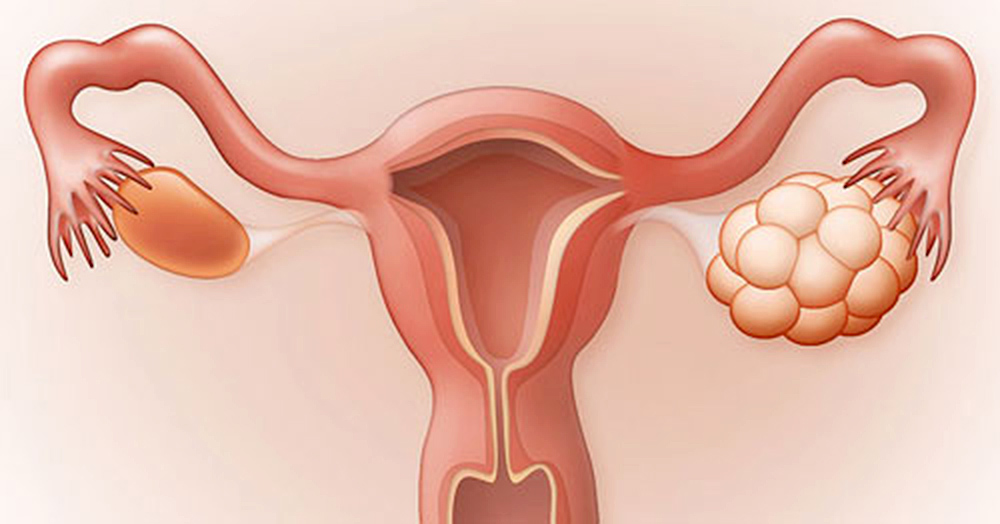
What is the polycystic ovary syndrome?

PCOS is a heterogeneous metabolic endocrine disorder with probable genetic origin and that is influenced by factors such as diet and physical activity, its clinical characteristics are related to hyperandrogenism (excess production or action of exogenous androgens) that derives hirsutism ( excessive development of hair, due to a disorder of the adrenal glands), acne and menstrual disorders, another clinical feature is obesity and derives insulin resistance, as a consequence it is a risk factor for the development of intolerance to hydrates carbon dioxide, type 2 diabetes mellitus and infertility.
How is the diagnosis of PCOS?
Oligoovulation (irregular menstrual cycles with eventual ovulation) pregnancy can be achieved without treatment, and Anovulation
Clinical or biochemical hyperandrogenism
Polycystic ovaries
At least 2 of the three criteria mentioned are required.
How should the diet be when faced with this condition?
Although that there are many doubts,about should I or what shouldn´t I eat, if there are foods that can improve the functioning of the body while having PCOS, there may also be concern if you are having an inadequate diet.
I present some important aspects that we must consider:
An adequate weight. Being overweight or some level of obesity is the main enemy of PCOS, therefore, the first indispensable measure is to change that inappropriate weight, how? Through changes from bad to healthy habits, the initiation of physical activity, which will help change that weight. If your weight is adequate, you should only base yourself on a correct diet and physical activity.
Diet, which does not mean abstaining or starving for weight reduction, is rather the change of habits that are going to be healthy and that are adopted for life, as a result you will have a better diet, an adequate weight and your body will thank you.
Remember that food must be adequate to your needs, food plans are individualized and their objective is to adapt to what you need.
What foods to eat:
Fresh vegetables and fruits. They are a source of vitamins, minerals and fiber, as well as antioxidants that your body needs to maintain cellular health. Leafy green vegetables are packed with nutrients like iron, potassium, calcium, magnesium, and vitamins B, K, C, and E.
Vitamins of group B are important for the management of symptoms associated with PCOS, in addition vitamin B has an important role in the metabolism of sugars and fats, maintaining hormonal balance and ensuring optimal functioning of the thyroid gland.
Cereals: such as pasta or rice must be whole, in oatmeal preferably, these will help you maintain your blood sugar level in optimal figures therefore you must avoid processed ones destabilize your blood sugar and in excessive consumption will cause an increase in weight.
Proteins: you must consume the adequate amount depending on your needs, we can also obtain it in two ways: protein of animal origin (chicken, fish, beef) and vegetable origin (legumes, walnuts, soybeans).
Fats: such as olive oil, dried fruits, flaxseeds, pumpkin, are a source of vitamin E that is associated with infertility, they also have an antioxidant effect to prevent cell damage, salmon is a natural source of omega 3 fatty acids.
What foods to avoid:
High glycemic index, refers to the effect these foods have on blood sugars, once ingested. Among them we find pastries, cookies, breads, cake and sweet cakes, soft drinks and industrialized juices, yogurts, ice creams, pasta and white rice.
Dairy: contribute to increase the levels of androgens (male hormones) and insulin. You should know that there are delicious vegetable alternatives such as rice, oatmeal or coconut drinks.
Saturated and trans fats are not healthy, they are not good for anyone, but they are even more harmful for women with PCOS, when you consume them, the level of fat in the blood rises and this process help the body to increase its production of estrogens immediately.
Saturated fat is mostly of animal origin and contains foods such as butter, margarine, cow’s milk and dairy products, sausages, chocolate, pork and cow’s meat, egg yolk.
Trans fats are unsaturated fatty acids that are industrially formed when liquid oil turns into solid fat, this process is called hydrogenation and the food industry uses it in a large part of processed and industrial products, examples:
- Industrial pastries, cookies, cakes and pastries.
- Frozen foods like ice cream, lasagna, pizzas.
- Fried products like croquettes and potatoes.
- Margarines and butters.
- Fast food.
You can identify them if among the ingredients when you see words like (totally or partially) hydrogenated.
- Avoid alcohol since its intake increases the pressure on the liver, an organ that eliminates excess estrogens in your body, if the liver focuses on filtering excess alcohol, the function of eliminating estrogens is relegated to the background . In addition, alcohol will end up turning into sugar, which causes insulin levels to rise in the body and also remember that alcohol is related to weight gain.
